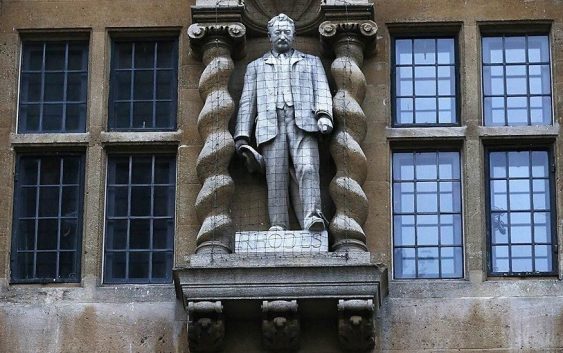- WICKNELL CHIVAYO left school at 15
- DISGRUNTLED Zimbabwe police stage uniform protest.
- MNANGAGWA wife Auxillia drops charges against nine women who boed her in Manicaland
- O.J. Simpson dies of cancer , aged 76.
- South Africa ANC is the cause of ZIMBABWE troubles claims Zimbabwe opposition politician Job Sikhala
Around 150 Oxford University academics refuse to teach over the statue of white supremacist and racist, Cecil John Rhodes statue.

Around 150 Oxford University academics refuse to teach at one of its colleges over the controversial statue of Cecil John Rhodes statue.
For years campaigners have been calling for the statue at Oriel College to go, saying Rhodes stood for white supremacy and racism.
But last month the college decided not to take it down for practical reasons.
Now, some academics are boycotting Oriel and have signed a petition saying the statue “glorifies colonialism”.
They are refusing to give tutorials to undergraduates from Oriel or attend talks there, as first reported by the Daily Telegraph.
Why is Cecil Rhodes such a controversial figure?How do you replace a fallen statue?Rhodes was a businessman and politician who played a big role in southern Africa in the 19th Century. He thought of the English as a master race, and his critics see him as the ultimate representation of colonialism and one of the people who helped pave the way for apartheid.
He had been a student at Oriel, and his statue is now above a doorway of a building named after him.
Oriel’s governing body said last year that the majority of its members wished the statue to be removed. But after an inquiry, the college decided not to remove it due to the cost and complex planning processes.
The Oxford lecturers say the decision of Oriel not to remove the statue “undermines us all” – and that the whole university can only work to eradicate racism if all its colleges do so.
“Faced with Oriel’s stubborn attachment to a statue that glorifies colonialism and the wealth it produced for the college, we feel we have no choice but to withdraw all discretionary work and goodwill collaborations,” a statement from the boycott organisers said.
As well as refusing to tutor Oriel students, the dons will also not help the college when it interviews admissions candidates or attend talks sponsored by it.
The boycott does not include work which is not discretionary, such as exams, delivering lecturers and supervising postgraduate students.
The dons said the boycott was done “with regret”, but would continue “until Oriel makes a credible public commitment to remove the statue.”
There have been some creative ideas of what to do with controversial statues, if they are removed.
Some have suggested just leaving the space empty, while sculptor Antony Gormley has suggested turning the Rhodes statue to face the wall.
One of the academics to sign up to the boycott is Robert Gildea, professor emeritus of modern history at Oxford University.
He told BBC Radio 4’s Today programme it was a way of putting pressure on the college after alternative attempts had not worked and said taking no action was “not acceptable”.
“If the college put up a notice explaining who Cecil Rhodes was that would be fine, if the college put a placard round his neck at lunchtime today saying ‘sorry’ that would also be fine. Anthony Gormley has suggested that the statue simply be turned the other way and face the wall and that would also be a very interesting idea,” he said.
The graffitied statue of slave trader Edward Colston in Bristol that was toppled during a Black Lives Matter protest last year is now on display at a museum. Any decision to remove the Rhodes statue would require planning permission from Oxford City Council, Historic England and the secretary of state for local government.
Announcing its decision last month, Oriel said: “In light of the considerable obstacles to removal, Oriel’s governing body has decided not to begin the legal process for relocation of the memorials.” BBC